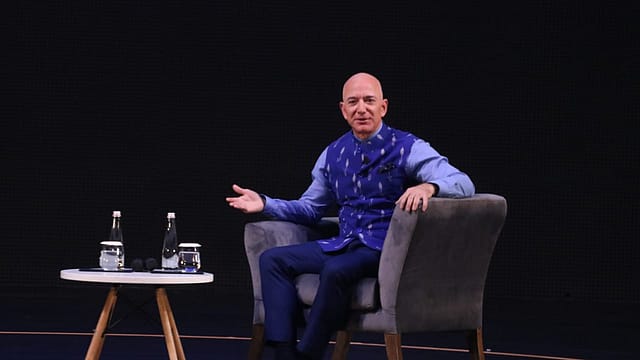Amazon to invest $1 bn in India to digitise small businesses
ADVERTISEMENT

American online retail giant Amazon’s founder and CEO Jeff Bezos said on Wednesday that his company plans to invest $1 billion (₹6.5 crore) in India. “Twenty-five years ago Amazon was a tiny little company. Today we are going to invest an incremental $1 billion in digitising small and medium businesses (SMBs) in India,” Bezos said at the Amazon SMBhav event, which focusses on discussions around how technology adoption can help SMBs in India, in New Delhi.
Bezos, who is on a three-day visit to India, said he’s making this announcement now because it’s working. “And when something works, you should double down on it.”
“Amazon India Marketplace is a huge success and has formed the basis of the company’s India business. We are trying to use Amazon’s size, scope, scale, and its global footprint to export $10 billion worth of ‘Make In India’ goods across the world by 2025,” he said. He advised small businesses to hire people who can teach things. “And that has been the secret to the scaling of Amazon all along the way,” he said.
Talking about Amazon’s journey, Bezos said, “I have seen Amazon when it was just me and today around the world it’s 700,000 people. And at each stage, I’ve had to lead the company differently. You not only have to figure out what to do but also how to do it... then as the company starts to grow bigger you help much less with the how but start to figure out what more.”
January 2026
Netflix, which has been in India for a decade, has successfully struck a balance between high-class premium content and pricing that attracts a range of customers. Find out how the U.S. streaming giant evolved in India, plus an exclusive interview with CEO Ted Sarandos. Also read about the Best Investments for 2026, and how rising growth and easing inflation will come in handy for finance minister Nirmala Sitharaman as she prepares Budget 2026.
“So, you kind of go from the question of how, to what, to the question of who. And that’s been my progression,” the Amazon founder said.
Bezos expected the 21st century to be an Indian century. “The India-U.S. alliance will be the most important in the 21st century.”
This comes amid the country’s largest traders’ body, the Confederation of All India Traders (CAIT), protesting against the “predatory discount practices” of e-commerce companies.
Amazon is also likely to face headwinds from the Competition Commission of India (CCI) which has launched an investigation into an alleged law violation by retail giants like Amazon and Walmart-backed Flipkart. On Monday, the CCI said, “The Commission observes that the exclusive arrangements between smartphone/mobile phone brands and e-commerce platform/select sellers selling exclusively on either of the platforms, as demonstrated in the information, coupled with the allegation of linkages between these preferred sellers and OPs (opposite parties) alleged by the Informant merits an investigation,” in its order.
Earlier in December, Amazon’s rival Walmart also announced a new supplier development programme in India to train 50,000 micro-, small- and medium-sized enterprises (MSMEs), which was also met with widespread protests by various trade unions in the country.
Meanwhile, India remains the biggest battleground for Walmart and Amazon, as both try to capture as many merchants and consumers in the rapidly growing market. India’s e-commerce market is expected to become $84 billion by 2021, says a report by Deloitte.
Flipkart, according to a report by Forrester Research, is still the single-largest online retailer in India, with a 31.9% market share in 2018, closely followed by Amazon at 31.2%. After adding the market share of group companies Myntra and Jabong, Flipkart has a 38.4% market share. The entry of Mukesh Ambani-owned Reliance Industries is expected to disrupt the industry. In December, Reliance started testing its online grocery retail business with the launch of Jio Mart.
Arvind Singhal, chairman of retail consultancy Technopak Advisors, says despite being a relatively early starter in India, Amazon has a lot of catching up to do. “I am not comparing it with Flipkart, I am comparing it to Reliance. Reliance is already ahead in its plan to enlist merchants, small and medium enterprises. Reliance already has an advantage with the Reliance cash and carry format. and it has almost 400 million captive customers through its Jio platform. It is going to be a tough task for Amazon to play catch-up with Reliance,” says Singhal.
